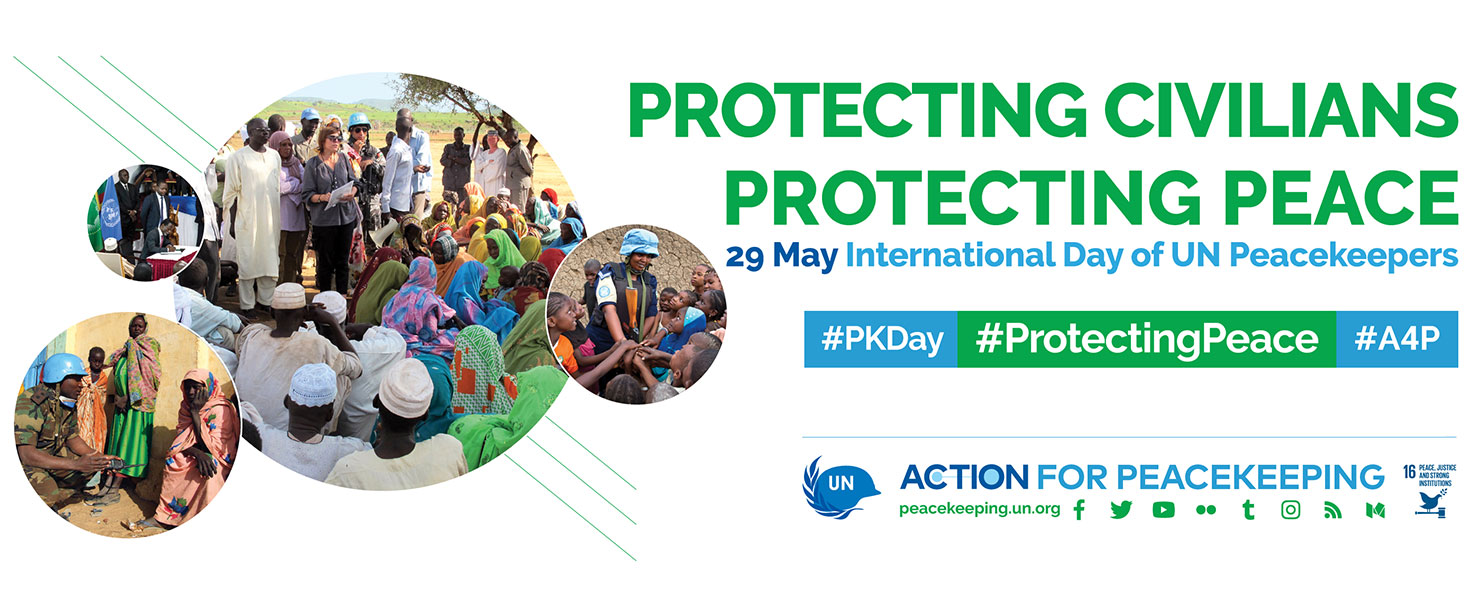

Photo: United Nations
"For millions in conflict-affected situations around the world, peacekeeping is a necessity and a hope. Let us work together to make peacekeeping more effective in protecting people and advancing peace." — UN Secretary-General António Guterres
2019 Theme: “Protecting Civilians, Protecting Peace”
The International Day of United Nations Peacekeepers, 29 May, offers a chance to pay tribute to the uniformed and civilians personnel’s invaluable contribution to the work of the Organization and to honour more than 3,800 peacekeepers who have lost their lives serving under the UN flag since 1948, including 98 last year.
The theme for this year’s Day is “Protecting Civilians, Protecting Peace” to mark the upcoming 20th anniversary when for the first time the Security Council explicitly mandated a peacekeeping mission (UNAMSIL in Sierra Leone) to protect civilians.
Over the past 20 years, protection of civilians has increasingly been at the heart of UN peacekeeping. Today, more than 90% of our peacekeepers serving in eight peacekeeping operations -- in Abyei and Darfur, the Central African Republic, the Democratic Republic of the Congo, Haiti, Lebanon, Mali and South Sudan – have protection of civilians’ mandates. These peacekeepers put themselves in harm’s way to protect civilians from violence every day.
The first UN peacekeeping mission was established on 29 May 1948, when the Security Council authorized the deployment of a small number of UN military observers to the Middle East to form the United Nations Truce Supervision Organization (UNTSO) to monitor the Armistice Agreement between Israel and its Arab neighbors.
Since then, more than 1 million men and women have served in 72 UN peacekeeping operations, directly impacting the lives of millions of people, protecting the world’s most vulnerable and saving countless lives. From Cambodia to El Salvador, Liberia, Sierra Leone, Timor Leste, and elsewhere, UN peacekeeping has helped countries move from war to peace.
Today, in 14 peacekeeping operations on four continents, it deploys more than 88,000 military and police personnel -- from 124 Member States -- nearly 13,000 civilian personnel, and 1,300 UN Volunteers. Despite the size and breadth of its operations, peacekeeping’s budget is less than one half of one percent of global military spending. Peacekeeping has clearly proven to be a solid investment in global peace, security and prosperity.
Last year, the Secretary-General launched a new initiative, "Action for Peacekeeping (A4P),” calling for refocusing peacekeeping with realistic expectations; making peacekeeping missions stronger and safer, and mobilizing greater support for political solutions and for well-structured, well-equipped, well-trained forces. Over 150 Member States and regional organizations endorsed the ‘Declaration of Shared Commitments’ for A4P demonstrating a high level of support for the initiative.
At the UN Headquarters in New York this year, the Day will celebrate on 24 May. The Secretary-General will preside over a wreath-laying ceremony in honour of all peacekeepers who have lost their lives while serving under the UN flag last year. In addition, the Dag Hammarskjöld Medal will be awarded posthumously to the peacekeepers, who perished while serving in the cause of peace in 2018.
Why Do We Mark International Days?
International days are occasions to educate the public on issues of concern, to mobilize political will and resources to address global problems, and to celebrate and reinforce achievements of humanity. The existence of international days predates the establishment of the United Nations, but the UN has embraced them as a powerful advocacy tool. More information available here.
http://creativecommons.org/licenses/by/3.0/legalcode
Комментариев нет:
Отправить комментарий